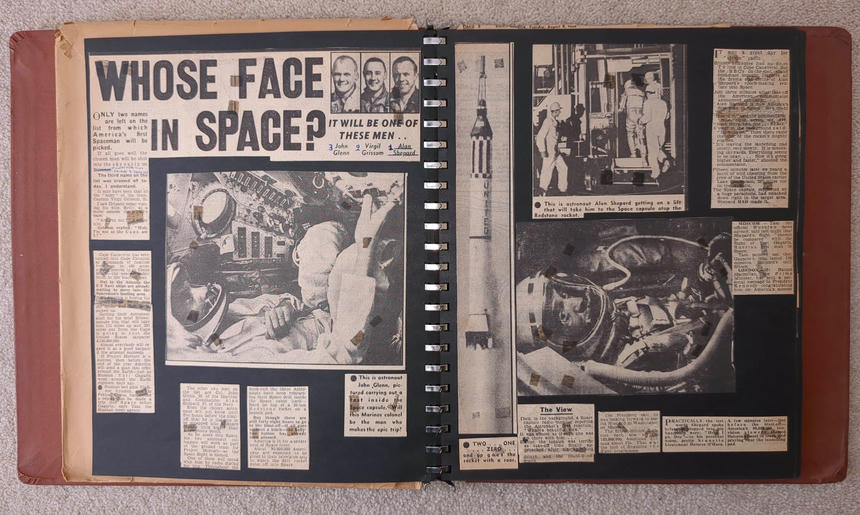Scrapbook 1: May 1961 — Alan Shepard, backup crew

WHOSE FACE IN SPACE?
IT WILL BE ONE OF THESE MEN . .
3 John Glenn
2 Virgil Grissom
1 Alan Shepard
ONLY two names are left on the list from which America’s first Spaceman will be picked.
If all goes well the
chosen man will be shot
into the sky early on
Tuesday POSTPONED TILL FRIDAY 3:34PM GMT
The third name on the list was crossed off today, I understand.
It may have been that of the “baby” of the team, Captain Virgil Grissom, 35.
I saw Grissom today visiting his wife, Betty, at a motel outside the Space base.
“Are you out?” I asked him.
Grissom replied: “Well, I’m not at the Cape, am I?”
The other two men on the list are Col. John Glenn, 39, of the Marines, and Commander Alan Shepard, 37, of the Navy.
Even the chosen astronaut will not know until five hours before the blastoff that he is the one to be strapped into a Space capsule little bigger than a telephone booth.
As he soars into Space, his two astronaut colleagues will work as part of the ground team for Project Mercury—as the Space flight is named.
One of them will speak with him by radio during his trip. Throughout the week-end the three Astronauts have been rehearsing their Space drill inside the Space cabin itself—fixed on top of a 30-ton Redstone rocket on a launch pad.
But though there are still forty-eight hours to go to the blast-off—if all goes without a hitch—the ballyhoo button has already been pressed.
America is in for a severe bout of Space fever.
About 90,000,000 Americans are expected to be glued to their television sets to watch the 83ft. rocket zoom off into Space.
Cape Canaveral has been turned into Cape Carnival as thousands of families from up to 100 miles around poured in to Cocoa Beach—the nearest public point to the blast-off pad.
Out in the Atlantic the US Navy ships are already waiting to move into the Spaceman’s landing area.
All America is hoping his capsule plop safely into the ocean and that he is picked up.
Getting their Astronaut aloft for his brief fifteen-minute trip that will take him 115 miles up and 290 miles out from the Cape is going to cost the United States taxpayer £150,000,000.
Almost everybody will regard it as a good bargain if the attempt succeeds.
If Project Mercury is a success, then before the end of the year America will send a man into orbit around the Earth—just as Russian Yuri Gagarin went around the Earth eighteen days ago.
Russian test pilot Vladimir Ilyushin, now in Peking, China, has denied a report that he made a trip into Space before Gagarin, says Tass, the Russian news agency.
This is astronaut John Glenn, pictured carrying out a test inside the Space capsule. Will this Marines colonel be the man who makes the epic trip?
This is astronaut Alan Shepard getting on a lift that will take him to the Space capsule atop the Redstone rocket.
IT was a great day for “steam” radio.
British audiences had no direct TV link in Cape Canaveral. But the BBC’s on-the-spot sound broadcast brought listeners all the drama and thrills of Alan Shepard’s epoch-making venture into Space.
Just three minutes after take-off the American commentator announced excitedly: “Alan Shepard is now America’s first man in Space. He’s made it.”
“This is it,” said the commentator. “Nine eight, seven, six, five, four, three, two, one . . . ZERO.”
A voice in the background said: “Ignition on.” Then there came the roar of the rocket’s mighty engines.
“It’s leaving the launching pad slowly, very slowly. It is mounting skywards. Everything seems to be okay. . . . Now it’s going higher and faster,” shouted the commentator.
Fifteen minutes later we heard a burst of wild cheering from the crew of the United States carrier Lake Champlain, 297 miles out in the Atlantic.
The Space capsule, supported by a huge parachute, had smacked down right in the target area. Shepard HAD made it.
MOSCOW — Tass the official Russian news agency, said last night that Shepard’s flight “cannot be compared” with the flight of Yuri Gagarin, Russia’s first man in Space.
Tass pointed out that Gagarin’s trip lasted 108 minutes, Shepard’s only fifteen.
LONDON.—Mr. Harold Macmillan, the Prime Minister, has sent a personal message to President Kennedy congratulating him on America’s success
TWO . . . ONE . . . ZERO . . . and up goes the rocket with a roar.
The View
Then, in the background, a Space capsule radio monitor reported the Astronaut’s first reaction:
“What a beautiful view.” It was almost as though one was up there with him. . . .
Earlier, the tension was terrific as take-off time finally approached after six agonising delays, and the count-down began.
The President said he was looking forward to seeing Shepard in Washington on Monday.
The fifteen-minute fight cost each one of the 180,000,000 American citizens about 17s. That was the cost of financing the flight programme
PRACTICALLY the last words Shepard spoke before he stepped into his Spaceship were: “Here I go, Dee”—to his personal nurse, pretty brunette Lieutenant Dolores O’Hara.
A few minutes later—just before the blast-off—America’s 90,000,000 television viewers showed Dolores almost in tears, and praying near the launching pad.